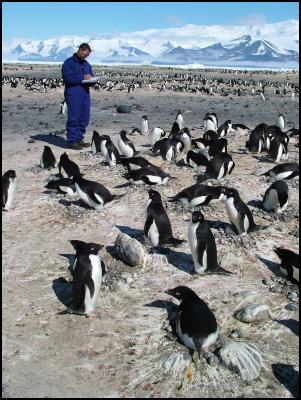Environmental Grant To Aid Antarctic Research
9th November 2005
Canon New Zealand Awards
Inaugural Environmental Grant To Aid Antarctic
Research

An important environmental project about to be undertaken by Antarctica New Zealand has been given a boost by Canon New Zealand who has awarded the organisation its inaugural Canon Environmental Grant.
The $15,000 product grant was established by Canon and will be awarded on an annual basis to persons or organisations to assist with environmental projects or research.
Antarctica New Zealand will use the $15,000 product grant to equip their team with EOS20D cameras and equipment that will be used to monitor the environmental impact of visitors at different sites in New Zealand’s territory in the Ross Sea region of Antarctica.
Lou Sanson, Antarctica New Zealand CEO, said that with rising tourist numbers in Antarctica it’s vitally important to monitor visitor impact on this pristine environment.
“Gathering regular photographic evidence at fixed points is a key part of the proposed monitoring methodology. It will help us understand what effects humans are having at the sites. We can then advise tour operators on minimising their impacts, such as the best way to move visitors around sites or those times of year when visiting should be avoided altogether so as not to disturb wildlife,” said Mr Sanson.
“Canon’s equipment will contribute significantly to the success of this project. The grant enables us to equip all observers on tour voyages to the Antarctic’s Ross Sea in time for the 2005/2006 summer which is great news.”
The first of nine tour ship voyages to the Ross Sea departed yesterday (Tuesday 8 November). The monitoring will take place over the summer period (December to March) each year and the results will be collated by Antarctica New Zealand and made available on the web. The information will then form the basis for Site Guidelines to be used by Antarctic operators, with the goal to have them adopted by the international Antarctic Treaty Consultative Parties.
The project was chosen from close to 60 other submissions put forward by people or organisations carrying out environmental work.
Tony Wills, managing director, Canon New Zealand said Antarctica New Zealand is a worthy inaugural recipient whose environmental impact monitoring project will benefit a remote and very special part of New Zealand’s environment.
“We know that when it comes to environmental work resources can often be stretched,” said Mr Wills. “Canon recognises the importance of having quality equipment to record, document and process studies and research, and this is where we hope the Canon Environmental Grant will help.”
In the spirit of kyosei – Canon’s corporate philosophy and a Japanese term that means living and working together for the common good - Canon stresses environmental protection both in its daily operations and through support activities.
“Antarctica New Zealand will be pleased to know that not only will they have the latest equipment to help them operate more effectively, but that the equipment – like all Canon products – have been designed with the environment in mind,” said Mr Wills.
Submissions for Canon New Zealand’s Environmental Grant 2006 will open on the international World Environment Day next June.
ENDS


 Transport Well NZ: Transport Well New Zealand Charitable Trust - A Vision For The Entire Sector
Transport Well NZ: Transport Well New Zealand Charitable Trust - A Vision For The Entire Sector KiwiRail: Auckland Rail Network Reopens After Successful Upgrades
KiwiRail: Auckland Rail Network Reopens After Successful Upgrades ChargeNet: EV infrastructure co-funding model welcomed
ChargeNet: EV infrastructure co-funding model welcomed NZ Trucking Association: TruckSafe New Zealand Launches | A Game-Changer For Heavy Vehicle Safety And Compliance
NZ Trucking Association: TruckSafe New Zealand Launches | A Game-Changer For Heavy Vehicle Safety And Compliance Gaurav Mittal, IMI: How Can We Balance AI’s Potential And Ethical Challenges?
Gaurav Mittal, IMI: How Can We Balance AI’s Potential And Ethical Challenges? Science Media Centre: Several US-based Environmental Science Databases To Be Taken Down – Expert Reaction
Science Media Centre: Several US-based Environmental Science Databases To Be Taken Down – Expert Reaction